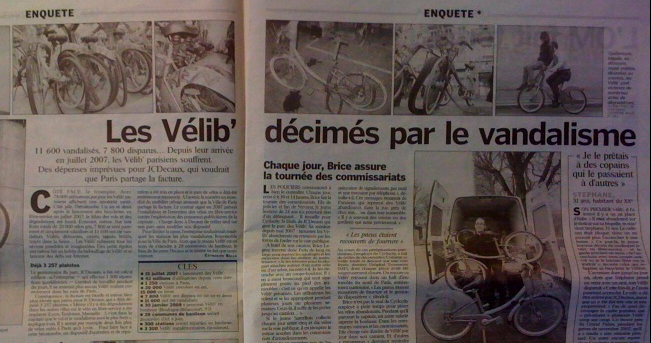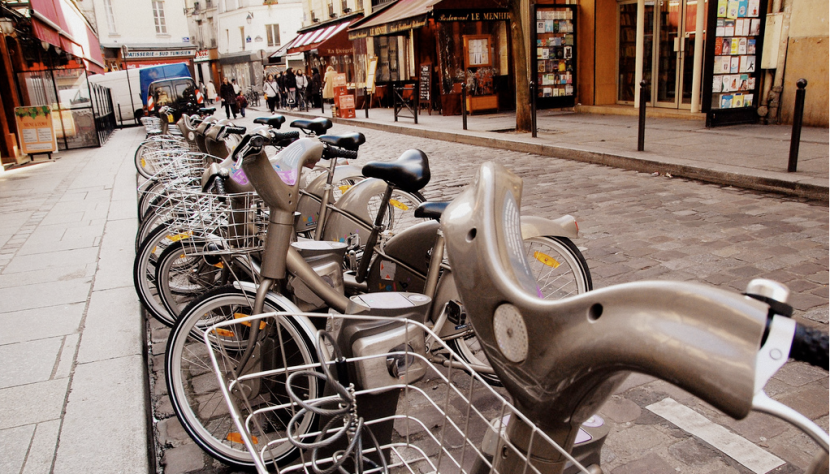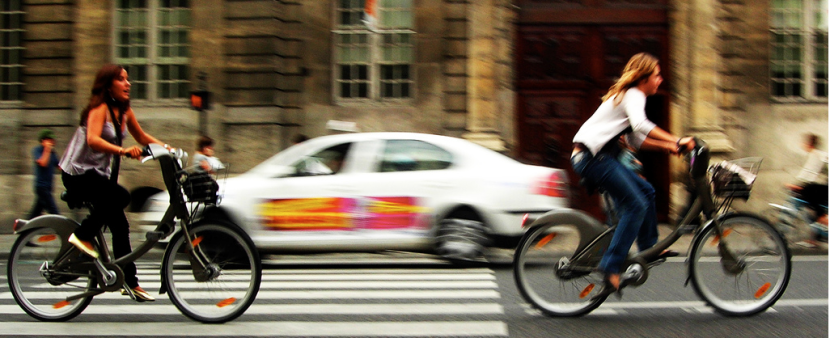Is Bicycling the Opposite of Disregard?
In today’s New York Times, a front-page story tells about both the success of the Vélib program in Paris, and frustrations among officials and Parisians regarding the abuse of the bicycles. Nearly 80 percent of the original fleet have been stolen or damaged. These events have caused some reflection and frustration in Paris:
“The symbol of a fixed-up, eco-friendly city has become a new source for criminality,” Le Monde mourned in an editorial over the summer. “The Vélib’ was aimed at civilizing city travel. It has increased incivilities.”

The story turns to the interesting and troubling crisis of identity and migration currently unfolding in France, pitting French ideals of freedom, civility, and solidarity against the chaos and violence among North African populations frustrated by the contradictions of suburban blight just outside the “City of Light.”
Bruno Marzloff, a sociologist who specializes in transportation, said, “One must relate this to other incivilities, and especially the burning of cars,” referring to gangs of immigrant youths burning cars during riots in the suburbs in 2005.
He said he believed there was social revolt behind Vélib’ vandalism, especially for suburban residents, many of them poor immigrants who feel excluded from the glamorous side of Paris.
“It is an outcry, a form of rebellion; this violence is not gratuitous,” Mr. Marzloff said. “There is an element of negligence that means, ‘We don’t have the right to mobility like other people, to get to Paris it’s a huge pain, we don’t have cars, and when we do, it’s too expensive and too far.’ ”
Its an interesting story, and worth reading. I think there is more to the problem than just the frustrations of immigrant suburban youth, as wealthy white Parisian kids are fully capable of dumb stunts and vandalizm. The Vélib program has been held up as one of the most successful and influential bike-share programs in the world. The degree of its success will continue to inform and provoke city governments around the world to set up similar programs.
The story also suggests the civility and responsibility of bicycling. Of course cycling is a beautiful cultural practice – and one doesn’t have to sit on a Parisian bench with an espresso watching elegantly appointed Parisians glide along to understand this. But it helps. The bicycle is also, of course, an elegant and beautiful machine.
Admittedly, there’s a sense of smug altruism that overcomes me in certain moments while bicycling. Riding represents responsible participation in civic life, riding not only for transportation, exercise, and enjoyment, but also for the greater good: taking small steps to combat climate change; reducing dependence on fossil fuels; and provoking planners and officials to rethink urban space. In many ways, bicycling is the opposite of disregard and selfishness. Perhaps this is why red light runners and rule flaunters on bikes cause such frustration among responsible bicyclers. This may also be why bicycling theft is such a low-down, snake belly form of criminality!
While riding, many of us see some of the least civic-minded behavior by motorists. Texting, phoning, middle fingers, aggressive and dangerous behavior. But we also see some of the best and most facilitative behaviors: care, caution, regard for others. Well… sometimes, anyway. Perhaps if more people walked or bicycled for utility reasons, we’d all be more inclined to exercise awareness and regard for each other. Or, like the suburban youth pinned for Vélib vandalization, if people feel detachment and resentment toward the freedom afforded by bicycling, we should expect continued aggression toward both bicycles and bicyclers.



I read a post, I think it was on Copenhagenize, earlier this year indicating that JC Decaux was actually vastly inflating the Velib damage numbers (since that nets them more cash from the French government). JC Decaux is the only source for those numbers, and they obviously have a vested interest; I find them rather suspect (the bikes cost $3,500 each??).
Totally messed up. Obviously the thieves and vandals are not committed cyclists (not going to show up at a club ride on one of those). To some in the general public, it may seem as though cyclists are stealing and trashing bikes, when in reality it may be people desperate to score a few Euros to buy their next fix of whatever drug they are unfortunate enough to be addicted to.
I lived in Miami years ago and people were stealing copper wire out of the street lamps to buy crack. Parisians may find a solution to this social problem (the stealing of public property) by addressing another (drug addiction).
Just a thought, Jack